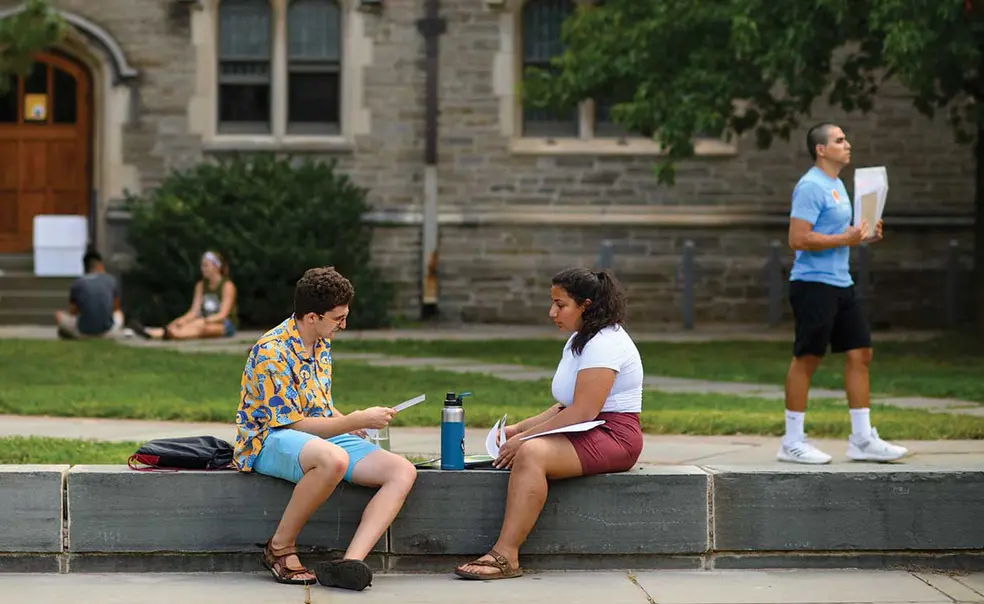Princeton Launches Fall Semester With Vaccines, Indoor Masking
Most restrictions that were in place for the spring semester have been relaxed
Julia Elman ’23 was “cautiously excited” for the start of the fall semester. Memories of a challenging spring were still fresh: burnout from the rigor of classes, unengaging lectures on Zoom, socially distanced hangouts with friends, and no in-person clubs or activities, all in the midst of the pandemic. Elman was reassured by the promise of a mostly normal fall semester, which the University confirmed was the plan during an Aug. 9 virtual town hall for students. Still, she said, “It seems like everything is tentative.”
“The University is committed to fulfilling its mission of in-person residential teaching and learning and has an array of public-health policies and protocols to support that mission,” said University spokesman Michael Hotchkiss in a statement to PAW. “The University is assessing conditions on campus and [in] the surrounding community on a constant basis and will adjust as necessary to pursue that mission.”
Most restrictions that were in place for the spring semester have been relaxed, largely because employees and students are required to be vaccinated before returning to campus. As of Aug. 17, 96 percent of graduate students, 92 percent of undergraduate students, and 93 percent of employees were vaccinated, according to Hotchkiss. Regular asymptomatic testing will also remain in place: once a week for vaccinated individuals and twice a week for those granted exemptions from the vaccine requirement.
Since the start of the pandemic, the number of COVID infections at Princeton has remained low, but this is the first semester that the full pre-COVID campus population was expected to return. For students who do fall ill, there are rooms on campus designated for isolation. Campus Dining and University Health Services will coordinate with students in quarantine and isolation to provide meals, and a designated staff member will interact with students to support other needs, according to Hotchkiss. Faculty members who get sick “will work with their departments to deploy their contingency plans for teaching,” he added.
Since July, there have been no capacity limits on campus, and social-distancing requirements have been dropped. All fall classes will meet in person with no virtual options available for students. Sports and campus events also have resumed, and students can return to dining halls and eating clubs as usual.
Early in the summer, masks were required only for unvaccinated individuals and encouraged for others, but Princeton announced a universal indoor-mask mandate Aug. 11 in response to the Centers for Disease Control and Prevention’s recommendation that individuals wear masks indoors in areas of high transmission, regardless of vaccination status. The University will reevaluate the mandate in mid-September.
Unvaccinated international students were permitted to return early to quarantine in their rooms for up to 10 days and arrange to get vaccinated afterward. The University is working with international students on a case-by-case basis as some are experiencing uncertainties with visa issues and travel restrictions, Hotchkiss said. Shirley Ren ’24, from Toronto, said she was nervous about running into complications crossing the U.S.-Canada border with her parents because crossings were limited to essential travel in mid-August. “I’m not personally aware of any support, for example, of someone I can call if I can’t cross the border,” Ren said, adding she would have appreciated more guidance and clarity earlier in the summer.
New travel guidelines also went into effect in August, allowing for domestic trips that “are feasible under any locally applicable public-health restrictions,” Aly Kassam-Remtulla, associate provost for international affairs and operations, wrote in a July email to students. International travel restrictions remain in place for most undergraduates, with the exception of approved study-abroad programs.
Most students who spoke with PAW understand the restrictions that remain in place and are eager to put the last year and a half behind them. “I’m really glad they’re making an effort to be as normal as it can be,” said Audrey Yang ’25, in August. Yang was most looking forward to meeting new people and the prospect of a normal introduction to the University for her first year.
What students agree was largely missing from the virtual Princeton experience was true connection. “One of the best things about being on campus was just walking into a lunch room and seeing new faces, old faces, faces of friends,” said Jake Snyder ’23. “I mean, it was just so refreshing. So not having that for the past year and a half, it’ll be nice [to return].”
But that cautious optimism may be at odds with the highly contagious delta variant of the coronavirus, which was the predominant strain across the United States as of mid-August. “I’m feeling a little more anxious about it just because of the rise of cases currently happening in the tri-state area,” Oscar Platt ’24 said about returning to campus. He added, “I feel very safe and confident knowing that there’s going to be a vaccine mandate, and I think masks are just a good precaution to have on top of that.”
Students also hope the University will address the issues surrounding mental health that materialized in the spring. “I think mental health is a bigger worry than fully vaccinated individuals getting seriously ill from COVID,” said Kesavan Srivilliputhur ’23. “And I think Princeton needs to carefully weigh that out before they [consider] imposing harsh restrictions.”










No responses yet